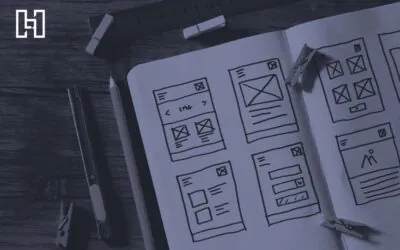Your business website isn’t just a digital representation of your brand—it’s a key way to rank in search engines and reach more customers. A high-quality, professional website can help you build trust with customers and establish your business as an authority in your field. Whether you’ll be using a DIY website builder or hiring a freelance web designer or web design agency—read on to learn how much web design costs in 2024 and the factors that will contribute to your website budget.
- What Are the Standard Parts of a Website Build?
- What Impacts Website Design Costs?
- Common Website Design Pricing Options

What Are the Standard Parts of a Website Build?
There are some things you’ll need to include in your website build no matter what. These build the framework for your website design as a whole, so it’s important to take them into consideration first when developing your web design budget.
| Website Component | Average Cost |
| Content Management System (CMS) | $0 to $400 per month |
| Domain Name | $10 to $20 per year |
| Website Hosting | Free or $4 to $140 per month |
| SSL Certificate | $0 to $300 per year |
| Content Writing | Free or starting at $25 per page |
| SEO | $0 to $500 per month |
| Website Design / Theme | $0 to $5,000 up front |
| Maintenance | $400 to $60,000 per year |
Content Management System (CMS) Software
- Average cost: Starting at $0 to $400 per month
If you don’t want to hard-code your site from scratch using HTML and CSS, a CMS such as Wix, Squarespace, or WordPress* is an essential part of your website build. If you plan on editing or adding to your business website yourself or having an internal team modify your website content, you’ll need a CMS so you and your team can access and edit it easily without having to learn in-depth coding skills.
According to Max Riffner, Hurrdat’s Creative Director,
“As your business grows, SEO and customization will become more urgent. It’s going to be worth investing into a more robust content management system, which is typically a WordPress website on an optimized server.”
Beginner-friendly website builders like Wix and Squarespace usually range from $15 to $30 a month for their starting costs, but that comes with hosting capabilities and domain provider included. Larger businesses with bigger budgets might also consider a more robust CMS plan. In contrast, the open-source CMS software for WordPress is completely free, but you’ll have to pay for other website components like hosting—either through WordPress itself, or a third party.
*WordPress.com and WordPress.org, while part of the same company and use the same software, are two different products. The “.com” version of WordPress includes managed website hosting as part of your paid plan, while the “.org” version of WordPress is a free download of the source code that you must upload to an external website hosting provider that you pay for separately.
Domain Name
- Average cost: $10 to $20 per year
To have a unique domain name, you’ll need to pay an initial registration fee, and then pay annually to renew your domain name. The initial fee for your first year is usually the same or lower than the following annual payments.
There are a few things that factor into the cost of your domain name. Different domain extensions will cost more or less depending on competition—since “.com” and “.net” are very common, they’re less expensive and reflect more of an average industry cost. You may be able to save on initial costs for a domain name when you register through your website software, or you can purchase a unique domain name through a domain registrar.
If you’re absolutely set on a very specific domain name and it was previously taken, or if it’s shorter and regularly searched, it may be considered a premium domain. These domain names are usually available on an aftermarket service (if it was previously registered) or through a domain registry at a much higher price than a standard domain name.
It’s not recommended to use a free domain name that might be offered by your website builder with a tag like “wixsite” in the URL. Even if the URL is also branded with your business name, it still harms your professional credibility and stops you from building more of a definitive brand identity since your brand is not at the forefront.
Website Hosting
- Average cost: Free or starting at $4 to $140 per month
Your website will need to be hosted somewhere in order to be on the internet. Essentially, you’ll pay the website hosting platform to store your website files on a server that connects to the internet.
There are plenty of places you can host your website, starting with a website builder. These online platforms typically include hosting as part of your monthly plan. If you’re building your site using open-source software that doesn’t include hosting, you can host your website through platforms like Bluehost or HostGator, which offer a variety of plans—and sometimes give you the option to choose between monthly or yearly payments.
A shared hosting plan puts your website on a server that is shared by multiple sites, which is why it can cost as little as a few dollars per month—making it a great, cost-effective option for many small business websites. However, businesses with larger websites that get a lot of traffic may want to invest in a virtual private server (VPS) or dedicated hosting plan, giving your website the storage space to run smoothly as traffic increases.
A VPS can be considered the middle tier of pricing (costs range from $32 to $72 per month with Bluehost). This option puts your website in its own private compartment within a larger server shared with other businesses. Dedicated hosting is the most expensive (ranging from $92 to $142 per month with Bluehost), as it’s a completely private server devoted to hosting only your website.
SSL Certificate
- Average cost: $0 to $300 per year
A Secure Sockets Layer (SSL) is an added layer of encryption on your website that protects your visitors’ data from third parties or hackers. Depending on the type of SSL certificate you need or want, you could spend anywhere from nothing (if your website hosting platform or domain provider includes an SSL certification in your plan) to over $1,000 for maximum coverage. Many hosting platforms offer plans with SSL certificates included, and SquareSpace offers an SSL certificate as part of their domain name provider service. Outside of your website hosting platform or domain name provider, you can get an SSL certification from providers like Comodo, DigiCert, or GlobalSign.
Content Writing
- Average cost: Free or starting at $25 per page
Once you have the bare bones of a site set up, you need well-written and informative website copy to fill in your pages. This is something you could do yourself, but if you have a lot of pages to get done or a tight deadline for your business website launch, it may be a good idea to outsource.
Agencies and freelancers will generally charge a fee per individual page, or charge a certain amount per page template if they’re creating a uniform framework with section headers for you to duplicate and add business information—especially in the case of location pages or product and service pages. Some agencies may also factor hourly labor costs into their copywriting costs, so your website copywriting costs might come in the form of dollars per hour.
SEO
- Average cost: Starting at $0 to $500 per month
SEO is another essential element to factor into the cost of building a website, since this is what helps you rank in search engines so your customers can find you online. You can take the time to optimize your website content in-house for free, or you can hire an agency or SEO expert to optimize your website for you for a monthly or hourly fee. At minimum, you’ll need to make sure you cover the following SEO strategies for each webpage:
- Competitive research
- Keyword research
- Optimized title tags and meta descriptions
- Optimized headers
Riffner explains,
“As your business grows, SEO and customization will become more urgent. You can also look into hiring an SEO strategist to help you with your onsite and offsite SEO. Make sure you get a good SEO plugin for your site like Yoast. Your specialist may have their own plugin suggestion. I’d recommend using whatever they prefer.”
Website Design / Theme
- Average cost: Starting at $0 to $5,000 up front
Once all of your website files and content are in order, you’ll need to focus on how your website looks and performs. This has a large impact on how customers perceive your business—and good, professional visual design can even help you build trust early on. A professional business website should look attractive while also maintaining smooth performance for the best user experience.
Riffner says,
“Hiring a professional web design and development service can help you at this stage. I’d recommend looking into having a retainer set aside for your web developer also. Use it to handle monthly maintenance or new development as your needs change.”
Website builders offer free themes and visual elements, as well as premium themes you can buy. Either of these options are usually budget-friendly and can still provide a quality look to your business website. However, if you have budget to spare and want a completely unique and customized website, hiring a web designer or web design services is the way to go. Depending on the complexity of your site, this can cost up to several thousands of dollars.
Maintenance
- Average cost: $400 to $60,000 per year
Your business website isn’t something to set and forget. Aspects like your SSL certificate, website hosting, and domain name expire after a time, and you may need to revisit and update your products and services as your business changes, or do an SEO refresh.
The cost of website maintenance will heavily depend on the options you chose for your website components and their costs, especially for the aspects you’ll have to renew. The first thing to factor into your website maintenance budget is yearly costs for things like domain name, website hosting, and SSL certificates. Then, you should also add in funds that account for potential redesigns if you rebrand or refresh your business. This will involve more one-time costs, but they’re likely to take up a good amount of your yearly budget.
What Impacts Website Design Costs?
The above website components are all necessary to get your business website up and keep it running smoothly, but the amount of web design budget you’ll spend on them can depend on other factors. Here’s what to keep in mind when building your website.
Size of Business
The more visitors your business website is pulling in, the more traffic you have in your server. If you operate a large-scale business with broad reach, you’ll pull in a lot of website traffic—and if you don’t have the server space to accommodate the amount of people you need to serve, your website can have speed and functionality problems. Because of this, small businesses can get by on a shared hosting space, but large businesses will typically need to spend more for a VPS or dedicated server.
Number of Pages
Since most web designers charge per webpage, it tracks that the number of pages you need will directly impact your web design budget.
The main pages you’ll want for your website include a home page, contact page, and about page. For products, services, and physical business locations, it’s usually recommended to create individual webpages devoted to each one you offer, giving your business website more opportunities to rank in search. On the other hand, condensing these pages can help you save money. For instance, you could list all your services on a single service page, especially if the services you offer are all closely related.
Ultimately, you’ll have to weigh the advantages and disadvantages to see how many pages are necessary for success. Keep in mind that each webpage needs the following website components to estimate your cost:
- Content Writing
- SEO
- Web Design
Functionality
Standard website components are necessary parts of a static business website, but if you want additional functionality, you’re likely to pay more. E-commerce is one of the biggest examples of this—in order to create a functioning online store, you need things like a shopping cart feature, payment capturing, and checkout forms that cost more to design and secure.
Riffner adds,
“If you are selling online, start with the basic solutions in Squarespace and Wix. But plan on moving to Shopify if not starting from scratch with it. It’s the number one e-commerce platform for a reason. Even if you have built a website on WordPress, Shopify can integrate into it with ease.”
Additional website plugins and extensions can also add to your web design budget. There are free options, but for more intricate on-page reviews and testimonials, contact forms, or subscription forms, you may find a premium option is better suited for you. These premium website plugins could cost anywhere from $50 to $200, with billing cycles ranging from a one-time cost to monthly and yearly subscriptions.
Email Hosting
Email marketing is an important addition to your marketing strategy, and email hosting can help you send out more professional and effective emails. Email hosting allows you to store messaging on a separate server and get all your employees branded email addresses. In other words, you can replace the generic “gmail.com” or “yahoo.com” at the end of company email addresses with your domain name. Hosting services like DreamHost and A2 Hosting typically range from $1 per month to $18 per month on average, depending on how much storage space you need.
Analytics
It’s important to track activity and website metrics like click-through rate, traffic, and bounce rate on your website. Analytics software may be included in your web design plan if you outsource to a web designer or agency—or you can use platforms like Google Analytics for free. However, if you feel those options don’t meet your needs where another analytics software would, there may be additional costs involved.
Common Website Design Pricing Options
The range of factors impacting the cost makes it difficult to generalize how much a website build will cost, since every business will have different needs. However, here are three standard options for building a website that can help you better calculate your web design budget.
DIY Website Builder
Website builder software like Wix, Squarespace, GoDaddy, WordPress(.com), and Shopify will allow you to build your website yourself without hiring help, making it the more affordable web design option.
Riffner also adds,
“Starting with a limited budget, I recommend one of the builders like Wix or Squarespace. They have built-in templates that are built to be responsive for mobile devices. Your website is also served over a content delivery network so you don’t have to worry about optimization. These are great for bootstrapping entrepreneurs.”
That said, using a website builder takes up a lot of your time since you’ll have to build out every page yourself. This option is best for small business owners looking to save some money while still getting a professional-looking business website.
Includes:
- CMS
- Website hosting
- Website design elements
May Include:
- Domain name
- SSL certificate
- Analytics
Separate Costs:
- Content Writing
- SEO
- Maintenance
Website Builder Pricing Options:
- Wix: $16 to $159 per month
- Squarespace: $16 to $49 per month
- GoDaddy: $10 to $21 per month
- WordPress(.com): $0 to $45 per month
- Shopify: $39 to $399 per month
Freelance Website Designer
A freelance website designer is an individual you can contract to create your website. Hiring a freelance web designer comes with the largest range of cost options, since it will completely depend on the services offered, level of experience, and what you need for your business website. Once you find a web designer you like, you’ll likely need to send them a detailed brief of what your website needs, and they’ll tell you what their hourly cost will be.
An experienced freelance web designer can be a great choice if you’d like more flexibility in budget and a more customized website, since you can lay these terms out directly with your web designer of choice. However, keep in mind that you’ll still be covering hosting, security, and domain name costs in addition to whatever you’re paying the freelancer. If the freelancer you choose is working on many projects, you could also be faced with a wait time before your site is ready.
Includes:
- Content writing
- Website design
- SEO
Separate Costs:
- Domain name
- Website hosting
- SSL certificate
- CMS
- Analytics
- Maintenance
Freelance Web Designer Pricing Options:
- Starting at $15 an hour, ranging to $75+ an hour
Web Design Agency
A web design agency usually has pricing plans for website builds that business owners can choose from. Then, those businesses are taken on as clients of the agency and a team will build your business website for you. This is usually the most expensive option, but some web design agencies will use website builders to help lower your costs.
Riffner says,
“The nice thing about WordPress is that if you want to tinker with it yourself, you can! Everything you need to build, launch, maintain, and optimize your website is online. But it can get overwhelming, especially as you are also managing your business. A digital marketing agency can help you navigate a more complicated website build.”
As a client of a web design agency, you’re more likely to have a guaranteed timeline, more website components included, a standardized line of communication, ongoing SEO help, and website maintenance. However, this is the most expensive route, so small or brand-new businesses may not have room for this option in their budgets. For a growing or large-scale business, this is a great option that can take a big workload off you and your employees.
Includes:
- Content writing
- SEO
- Website design
- Maintenance
- Analytics
Separate Costs:
- CMS
- Domain name
- Website hosting
- SSL certificate
Web Design Agency Pricing Options:
- Using a website builder: $25 to $50+ an hour
- Without a website builder: $100 to $175+ an hour
Need a high-quality, professional website? Hurrdat Marketing offers convenient web design services that won’t break you web design budget. Contact us today to learn more!




